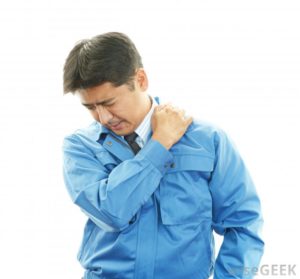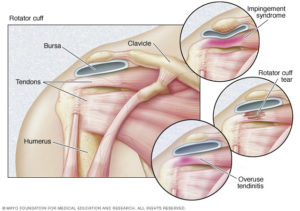
If you are a New York Mets fan, it’s likely you know of Craig Swan, a famous pitcher of the 70’s and early 80’s. A rotator cuff injury took Swan out of the game for 9 months. He was able to return to the Mets after receiving a Rolfing series.
Rotator cuff injuries can be debilitating. Pain, weakness, restricted motion and instability are the  most common symptoms of this problem. Certain arm movements become difficult or impossible, such as reaching behind you or over your head. These problems become exaggerated when weight is added or resistance is applied. When you have a rotator cuff tear, pain increases progressively as you use your shoulder and the discomfort is often worse at night.
most common symptoms of this problem. Certain arm movements become difficult or impossible, such as reaching behind you or over your head. These problems become exaggerated when weight is added or resistance is applied. When you have a rotator cuff tear, pain increases progressively as you use your shoulder and the discomfort is often worse at night.
What Happens In A Rotator Cuff Injury?
The rotator cuff muscles primarily stabilize the shoulder joint and also contributes to shoulder movement. The cuff is comprised of the tendons of 4 muscles: supraspinatus, infraspinatus, teres minor and subscapularis. Injuries to the rotator cuff include tendinitis, bursitis and tears.
Most rotator cuff injuries are the result of wear and tear brought on by repetitive motion. Poor alignment of the shoulder, head and neck are the primary risk factors that compromise the biomechanics of the shoulder and predispose you to a rotator cuff injury. Advanced age and smoking also compromise the integrity of the tendons throughout the body and predispose them to tears. Tears tend to begin as partial thickness and if left untreated, can progress to full thickness tears.
 Can Rolfing Help?
Can Rolfing Help?
Rolfing can play a crucial role in the recovery from a rotator cuff injury. Rolfing lengthens and repositions muscles to restore the alignment of the structure that is needed for balanced motion within the shoulder joint. Healing of the injured tissues can follow and future episodes can be avoided as the shoulder takes on a new and healthy movement pattern.
Partial thickness tears can heal with progressive strengthening, stretching and Rolfing. Once tears have reached full thickness they tend to require surgical repair.
Craig Swan later went on to pursue a second career as a Rolfer. His experience receiving Rolfing to treat his rotator cuff injury was life changing in more ways than one.
Also Read:
Featured Image Credit: greatbasinortho.com
